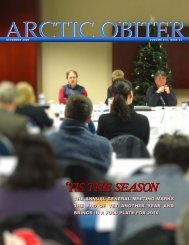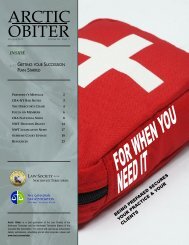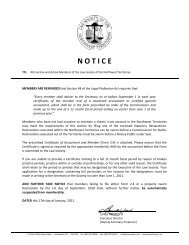ARCTIC OBITER
September/October 2011 - Law Society of the Northwest Territories
September/October 2011 - Law Society of the Northwest Territories
- No tags were found...
You also want an ePaper? Increase the reach of your titles
YUMPU automatically turns print PDFs into web optimized ePapers that Google loves.
SEPTEMBER/OCTOBER 2011 | 19<br />
S.C.C. UPDATE<br />
HERE IS A SUMMARY OF ALL APPEALS AND ALL LEAVES TO APPEAL (ONES GRANTED – SO YOU KNOW<br />
WHAT AREAS OF LAW THE S.C.C. WILL SOON BE DEALING WITH IN CASE ANY MAY BE AN AREA OF LAW<br />
YOU’RE LITIGATING/ADVISING/MANAGING). FOR LEAVES, I’VE SPECIFICALLY ADDED IN BOTH THE DATE<br />
THE S.C.C. GRANTED LEAVE AND THE DATE OF THE C.A. JUDGMENT BELOW, IN CASE YOU WANT TO<br />
TRACK AND CHECK OUT THE C.A. JUDGMENT.<br />
APPEALS<br />
CONSTITUTIONAL LAW: CHARTER<br />
S.7. S.1; DIVISION OF POWERS<br />
Canada (Attorney General) v. PHS<br />
Community Services Society<br />
(B.C.C.A., January 15, 2010) (33556)<br />
2011 SCC 44 (CanLII) | September 30, 2011<br />
The Controlled Drugs and Substances Act<br />
(“CDSA”) is applicable to Insite (a safe<br />
injection facility) and the scheme of the<br />
CDSA conforms to the Charter.<br />
However, the actions of the federal<br />
Minister of Health in refusing to extend<br />
Insite's exemption under s. 56 of the<br />
CDSA are in violation of s. 7 of the<br />
Charter, and cannot be justified under s.<br />
1.<br />
CRIMINAL LAW: CHILD<br />
PORNOGRAPHY<br />
R. v. Katigbak (Ont. C.A., June 8,<br />
2010) (33762)<br />
2011 SCC 48 (CanLII) | October 20, 2011<br />
The trial judge below made two errors<br />
of law requiring a new trial:<br />
by finding that the pornographic<br />
material fell within the scope of the pre<br />
-2005 artistic merit defence on the<br />
ground that the accused possessed the<br />
material for an artistic purpose,<br />
notwithstanding the fact that the<br />
material itself had no artistic merit and<br />
was not created for one of the<br />
enumerated purposes<br />
her interpretation of the phrase<br />
"legitimate purpose" in the current<br />
version of s. 163.1(6) by inquiring<br />
solely into the accused's subjective<br />
purpose for possessing the material.<br />
CRIMINAL LAW: FRAUD;<br />
SENTENCING<br />
R. v. Topp (Ont. CA, November 20,<br />
2009) (33529)<br />
2011 SCC 43 (CanLII) | September 23, 2011<br />
Past receipt of illegally obtained funds<br />
does not impose an evidential burden<br />
on offenders to prove they no longer<br />
possess their ill-begotten gains. In the<br />
absence of a credible explanation,<br />
however, it will often be open to the<br />
court to infer that the offender is able to<br />
pay a fine, but the court is not legally<br />
bound to do so. The probative weight<br />
of the inference will depend on the<br />
circumstances, and therefore vary from<br />
case to case.<br />
CRIMINAL LAW: SEARCH &<br />
SEIZURE; EXCLUSION OF EVIDENCE;<br />
CHARTER S.24(2)<br />
R. v. Côté (Que. C.A., February 18,<br />
2010) (33645)<br />
2011 SCC 46 (CanLII) | October 14, 2011<br />
The trial judge's decision to exclude<br />
observations made by police at the<br />
accused's home and the physical<br />
evidence collected pursuant to the<br />
warrants was owed deference.<br />
C.A.:<br />
The<br />
misconceived of its appellate role<br />
when it substituted its view of the<br />
police conduct for the trial judge's and<br />
when it placed undue emphasis on the<br />
seriousness of the offence<br />
holding that the police had not<br />
deliberately acted in an abusive<br />
manner was contrary to the trial<br />
judge's numerous findings of<br />
deliberate and systematic police<br />
misconduct<br />
emphasis on the seriousness of the<br />
offence was also misplaced given that<br />
the trial judge had acknowledged that<br />
the offence was serious and that the<br />
seriousness of the offence had been<br />
held not to be a determinative factor<br />
also erred in placing undue weight on<br />
the "discoverability" of the evidence in<br />
its s. 24(2) analysis.<br />
CRIMINAL LAW: SEXUAL ASSAULT;<br />
CONSIDERATION OF THE EVIDENCE<br />
AS A WHOLE; CIRCUMSTANCES IN<br />
WHICH TRIAL JUDGES'<br />
ASSESSMENT OF THE EVIDENCE<br />
CONSTITUTES ERROR OF LAW,<br />
THEREBY ALLOWING APPELLANT<br />
REVIEW<br />
R. v. J.M.H. (Ont. C.A., November 26,<br />
2009) (33667)<br />
2011 SCC 45 (CanLII) | October 6, 2011<br />
The trial judge, did not in fact, fail to<br />
consider the whole of the evidence, as<br />
the Court of Appeal concluded he had.<br />
As to what circumstances a trial judge's<br />
alleged mishandling of the evidence
















